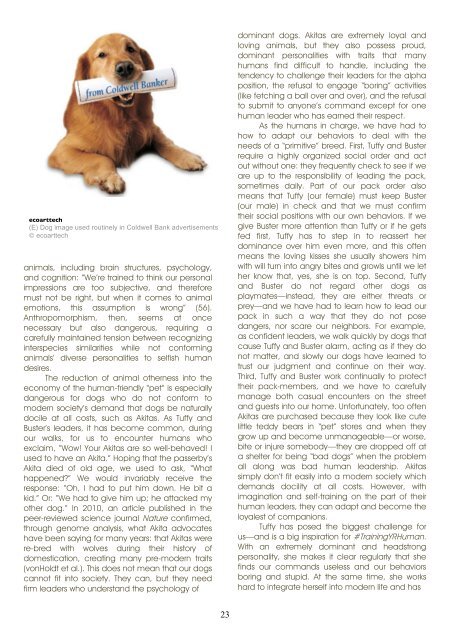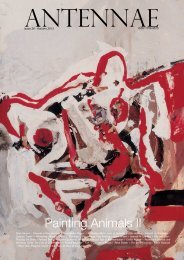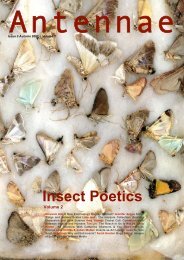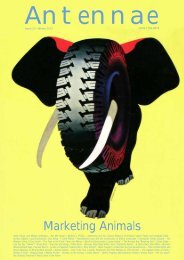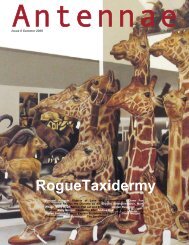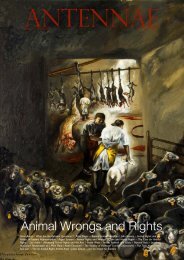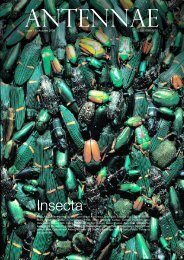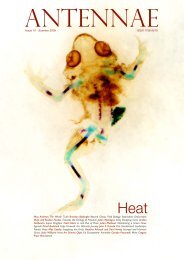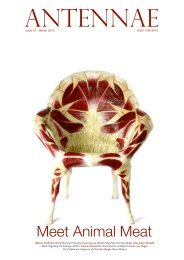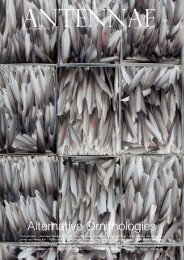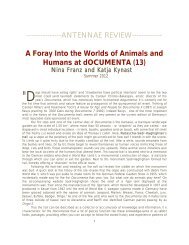Animal Influence I - Antennae The Journal of Nature in Visual Culture
Animal Influence I - Antennae The Journal of Nature in Visual Culture
Animal Influence I - Antennae The Journal of Nature in Visual Culture
You also want an ePaper? Increase the reach of your titles
YUMPU automatically turns print PDFs into web optimized ePapers that Google loves.
ecoarttech<br />
(E) Dog image used rout<strong>in</strong>ely <strong>in</strong> Coldwell Bank advertisements<br />
ecoarttech<br />
animals, <strong>in</strong>clud<strong>in</strong>g bra<strong>in</strong> structures, psychology,<br />
and cognition: “We’re tra<strong>in</strong>ed to th<strong>in</strong>k our personal<br />
impressions are too subjective, and therefore<br />
must not be right, but when it comes to animal<br />
emotions, this assumption is wrong” (56).<br />
Anthropomorphism, then, seems at once<br />
necessary but also dangerous, requir<strong>in</strong>g a<br />
carefully ma<strong>in</strong>ta<strong>in</strong>ed tension between recogniz<strong>in</strong>g<br />
<strong>in</strong>terspecies similarities while not conform<strong>in</strong>g<br />
animals’ diverse personalities to selfish human<br />
desires.<br />
<strong>The</strong> reduction <strong>of</strong> animal otherness <strong>in</strong>to the<br />
economy <strong>of</strong> the human-friendly “pet” is especially<br />
dangerous for dogs who do not conform to<br />
modern society’s demand that dogs be naturally<br />
docile at all costs, such as Akitas. As Tuffy and<br />
Buster’s leaders, it has become common, dur<strong>in</strong>g<br />
our walks, for us to encounter humans who<br />
exclaim, “Wow! Your Akitas are so well-behaved! I<br />
used to have an Akita.” Hop<strong>in</strong>g that the passerby’s<br />
Akita died <strong>of</strong> old age, we used to ask, “What<br />
happened?” We would <strong>in</strong>variably receive the<br />
response: “Oh, I had to put him down. He bit a<br />
kid.” Or: “We had to give him up; he attacked my<br />
other dog.” In 2010, an article published <strong>in</strong> the<br />
peer-reviewed science journal <strong>Nature</strong> confirmed,<br />
through genome analysis, what Akita advocates<br />
have been say<strong>in</strong>g for many years: that Akitas were<br />
re-bred with wolves dur<strong>in</strong>g their history <strong>of</strong><br />
domestication, creat<strong>in</strong>g many pre-modern traits<br />
(vonHoldt et al.). This does not mean that our dogs<br />
cannot fit <strong>in</strong>to society. <strong>The</strong>y can, but they need<br />
firm leaders who understand the psychology <strong>of</strong><br />
23<br />
dom<strong>in</strong>ant dogs. Akitas are extremely loyal and<br />
lov<strong>in</strong>g animals, but they also possess proud,<br />
dom<strong>in</strong>ant personalities with traits that many<br />
humans f<strong>in</strong>d difficult to handle, <strong>in</strong>clud<strong>in</strong>g the<br />
tendency to challenge their leaders for the alpha<br />
position, the refusal to engage “bor<strong>in</strong>g” activities<br />
(like fetch<strong>in</strong>g a ball over and over), and the refusal<br />
to submit to anyone’s command except for one<br />
human leader who has earned their respect.<br />
As the humans <strong>in</strong> charge, we have had to<br />
how to adapt our behaviors to deal with the<br />
needs <strong>of</strong> a “primitive” breed. First, Tuffy and Buster<br />
require a highly organized social order and act<br />
out without one: they frequently check to see if we<br />
are up to the responsibility <strong>of</strong> lead<strong>in</strong>g the pack,<br />
sometimes daily. Part <strong>of</strong> our pack order also<br />
means that Tuffy (our female) must keep Buster<br />
(our male) <strong>in</strong> check and that we must confirm<br />
their social positions with our own behaviors. If we<br />
give Buster more attention than Tuffy or if he gets<br />
fed first, Tuffy has to step <strong>in</strong> to reassert her<br />
dom<strong>in</strong>ance over him even more, and this <strong>of</strong>ten<br />
means the lov<strong>in</strong>g kisses she usually showers him<br />
with will turn <strong>in</strong>to angry bites and growls until we let<br />
her know that, yes, she is on top. Second, Tuffy<br />
and Buster do not regard other dogs as<br />
playmates—<strong>in</strong>stead, they are either threats or<br />
prey—and we have had to learn how to lead our<br />
pack <strong>in</strong> such a way that they do not pose<br />
dangers, nor scare our neighbors. For example,<br />
as confident leaders, we walk quickly by dogs that<br />
cause Tuffy and Buster alarm, act<strong>in</strong>g as if they do<br />
not matter, and slowly our dogs have learned to<br />
trust our judgment and cont<strong>in</strong>ue on their way.<br />
Third, Tuffy and Buster work cont<strong>in</strong>ually to protect<br />
their pack-members, and we have to carefully<br />
manage both casual encounters on the street<br />
and guests <strong>in</strong>to our home. Unfortunately, too <strong>of</strong>ten<br />
Akitas are purchased because they look like cute<br />
little teddy bears <strong>in</strong> “pet” stores and when they<br />
grow up and become unmanageable—or worse,<br />
bite or <strong>in</strong>jure somebody—they are dropped <strong>of</strong>f at<br />
a shelter for be<strong>in</strong>g “bad dogs” when the problem<br />
all along was bad human leadership. Akitas<br />
simply don’t fit easily <strong>in</strong>to a modern society which<br />
demands docility at all costs. However, with<br />
imag<strong>in</strong>ation and self-tra<strong>in</strong><strong>in</strong>g on the part <strong>of</strong> their<br />
human leaders, they can adapt and become the<br />
loyalest <strong>of</strong> companions.<br />
Tuffy has posed the biggest challenge for<br />
us—and is a big <strong>in</strong>spiration for #Tra<strong>in</strong><strong>in</strong>gYRHuman.<br />
With an extremely dom<strong>in</strong>ant and headstrong<br />
personality, she makes it clear regularly that she<br />
f<strong>in</strong>ds our commands useless and our behaviors<br />
bor<strong>in</strong>g and stupid. At the same time, she works<br />
hard to <strong>in</strong>tegrate herself <strong>in</strong>to modern life and has


